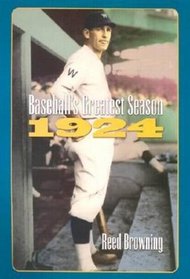Search -
Baseball's Greatest Season, 1924
Baseball's Greatest Season 1924
Author:
No season in the history of baseball matched 1924 for escalating excitement and emotional investment by fans. It began with observers expecting yet another World Series between the Yankees and the Giants. It ended months later when the perennially hapless Washington Nationals (Senators), making their first Series appearance, grabbed the world ch... more »
Author:
No season in the history of baseball matched 1924 for escalating excitement and emotional investment by fans. It began with observers expecting yet another World Series between the Yankees and the Giants. It ended months later when the perennially hapless Washington Nationals (Senators), making their first Series appearance, grabbed the world ch... more »
ISBN-13: 9781558494060
ISBN-10: 1558494065
Publication Date: 6/2003
Pages: 205
Rating: 1
ISBN-10: 1558494065
Publication Date: 6/2003
Pages: 205
Rating: 1
3 stars, based on 1 rating
Publisher: University of Massachusetts Press
Book Type: Hardcover
Other Versions: Paperback
Members Wishing: 0
Reviews: Amazon | Write a Review
Book Type: Hardcover
Other Versions: Paperback
Members Wishing: 0
Reviews: Amazon | Write a Review
Genres:




